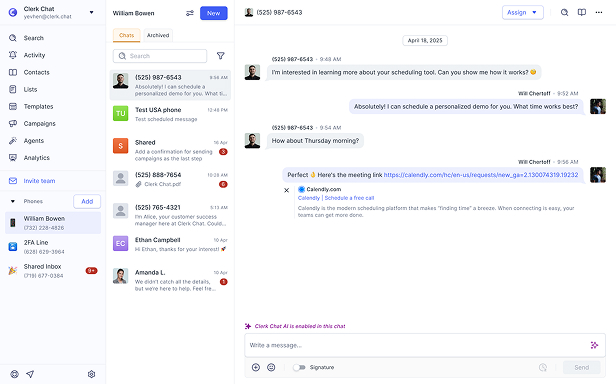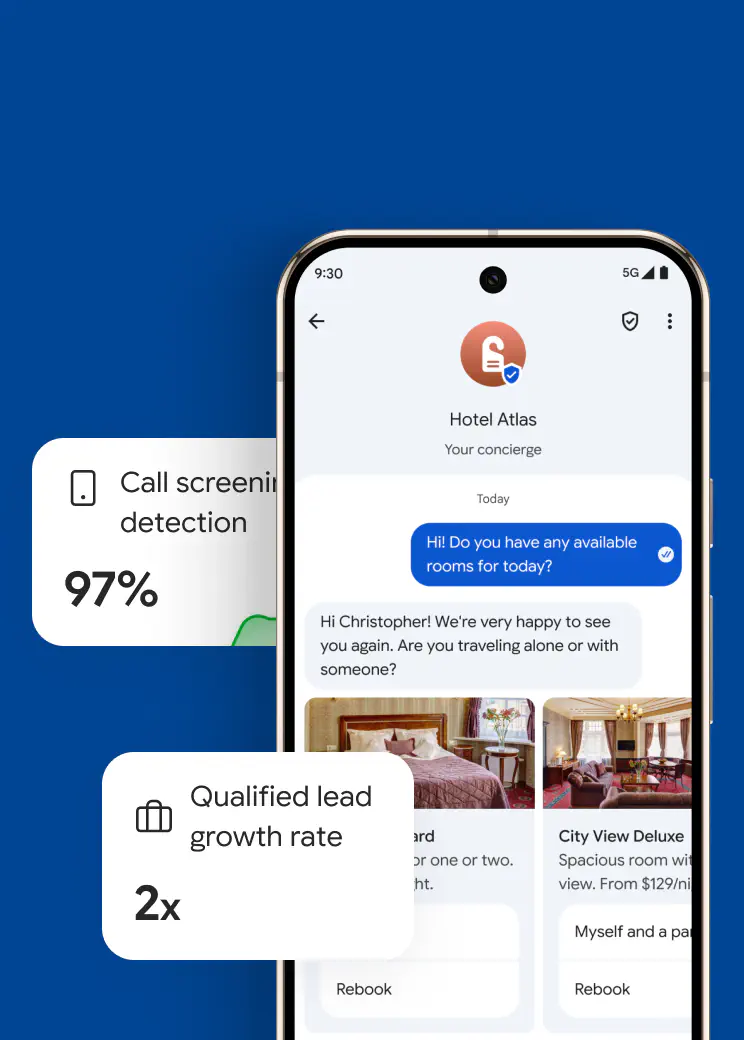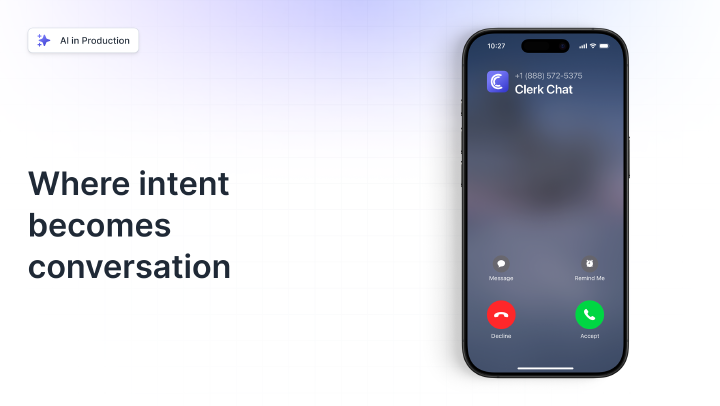How Conversational AI Lead Scoring Qualifies Faster and Converts to Sales
By William Bowen
- Published: July 9, 2025
Key points in this article:
- Lead scoring can be time-consuming and complex, but conversational AI makes generating, qualifying, and nurturing the right leads easier.
- Using NLP and machine learning, conversational AI tools can help you determine which leads are most likely to convert and create personalized sales strategies.
- Conversational AI tools can enhance the entire sales process, from streamlining initial lead generation and outreach to dynamically updating lead records, handling customer questions, and even personalizing sales messages.
- The best conversational AI lead scoring tools should leverage advanced NLP algorithms, integrations with your existing tools, and predictive analytics.
- To make the most of your conversational AI solutions, train your system, focus on compliance, and keep the human in the loop.
The role of the average salesperson revolves around generating, qualifying, nurturing, and converting leads. Unfortunately, many sales professionals struggle to engage and sustain the right leads. That’s where conversational AI lead scoring comes in.
With their unique ability to understand customer journeys, behaviors, and even sentiment, conversational AI tools offer sales teams an innovative way to identify the most promising leads faster than ever - and streamline their progress through the sales funnel.
Conversational AI platforms can analyze endless lead interactions, rank potential customers by value (or likelihood of conversion), and then seamlessly guide sales professionals through a personalized strategy for lead nurturing and conversion.
These tools turn every sales professional into a conversion expert, saving companies time, money, and resources. If you’re ready to upgrade your sales strategy, here’s everything you need to know about conversational AI lead scoring.
In this article:
What is AI Lead Scoring? The Basics
If you’re involved in sales, you probably know all about “lead scoring” - qualifying leads based on their potential value. But this process has changed a lot over the years. In the past, salespeople had to go through a list of leads manually and conduct extensive research to assign them a score.
Then, new CRM solutions emerged, making it easier to align customer data in a single space and speeding up the qualification process. Now, conversational AI for sales is bringing a new dimension to lead scoring.
Conversational AI tools use advanced technologies like natural language processing (NLP) and machine learning to understand and analyze human language. This allows these tools to process huge volumes of customer data, scanning through social media posts, call recordings, and previous conversations to identify relevant leads.
In seconds, a conversational AI tool can instantly identify which leads will most likely convert and show sales teams who they should prioritize. Some tools can even go further, suggesting the optimal time to reach out with a conversational SMS message or generating content for sales pitches.
The great thing about conversational AI lead scoring tools is that they don’t just make teams more efficient; they help companies more accurately identify the best leads based on relevant data and behavior, saving them from wasting time on the wrong opportunities.
How Does Conversational AI Lead Scoring Work?
These days, several different conversational AI tools can support sales teams with lead generation, qualification, and nurturing processes. They all have distinct features. For instance, Salesforce’s Einstein can score leads, update CRM records, and suggest outreach strategies.
Convin AI, on the other hand, helps more with extracting data from previous conversations, such as phone calls with prospects.
Although the features vary, most of these tools work similarly. First, a salesperson has an initial interaction with a customer or feeds a system information about their prospect (such as details from a social media profile).
Then, the conversational AI tool assesses the data, examines relevant behaviors, intent levels, and customer sentiment, and assigns each lead a specific score. Most apps can assess everything from behavioral to demographic data, firmographic data, engagement histories, and purchase intent signals.
Many conversational AI tools can also “prioritize” leads based on their stage in the sales cycle or potential value. Finally, the salesperson acts on this information, using what they learn to connect with, nurture, and eventually convert the lead.
Is your sales team ready to qualify leads faster with a plug-and-play AI agent?
Automating and Enhancing the Sales Process with AI
As mentioned above, most companies using conversational AI in customer service, marketing, and sales strategies don’t just use these tools for a single task. AI solutions can enhance and automate various processes in any business environment, including sales.
Typically, organizations use conversational AI lead scoring tools as part of a larger, comprehensive strategy designed to improve sales outcomes.


Generating Leads with Conversational AI
Generating a constant stream of high-quality leads isn’t easy for sales teams, particularly in such a competitive environment. Finding leads worth reaching out to can take hours or even days of work. AI tools for lead generation make a huge difference.
AI tools can scan vast volumes of customer and web data, instantly identifying potential prospects that match a company’s “Ideal Customer Profile”. Tools like HubSpot’s Breeze can even collect public contact details to share with sales teams (like LinkedIn URLs)
The same AI tools can also handle the initial “outreach” process for lead generation. For instance, once a conversational AI lead scoring tool has identified a lead with potential, it can reach out automatically to that prospect, using social media, email, or SMS for lead generation. The bot can ask questions to qualify the lead further, introduce them to products and services, and even encourage them to book a sales call.
The great thing about conversational lead generation tools is that they’re great at personalizing the initial discussion. Based on their data about a customer’s firmographics, demographics, or priorities, they can highlight products or features more relevant to their needs, creating “warmer” leads for sales teams to nurture.
Dynamically Scoring Leads with Conversational AI
Most conversational AI lead scoring tools take a consistent approach to “qualifying” leads. They don’t just review information once - they constantly update sales enablement tools and CRM platforms with new information gathered from additional conversations with prospects, or further web-based research.
That means these tools can give every lead a dynamic score that consistently reflects how likely the customer is to make a purchase as they move through the sales funnel. For companies using AI in sales, this introduces an opportunity to seek out and nurture better sales opportunities proactively.
Some tools can even proactively find additional information about a prospect, searching for psychographic data, social media updates, and anything else that offers insights into a prospect’s potential. Then, these tools can guide employees through the sales process.
For instance, Nova Auto Pros uses Clerk Chat’s conversational AI solution to identify leads that match their ideal customer profiles and proactively gather information about them. The Clerk Chat AI agents can ask customers questions, share insights with the sales team, and personalize sales strategies for each customer.
With these tools, Nova increased lead conversion rates by 25%, enhanced its lead quality by 25%, and boosted overall sales by 60%.
Nurturing Leads with Conversational AI
Although conversational AI lead scoring tools can help companies identify and prioritize the right leads more effectively, many customers still aren’t ready to convert immediately. Fortunately, AI tools aren’t just great at scoring leads or initiating outreach. They can also help nurture leads through the sales funnel.
For instance, an AI-powered lead follow-up tool can automatically send a message to a customer on their preferred channel after they download an eBook or case study, ask them questions, or offer a free consultation.
AI-powered text messaging tools can even identify the right time of day to contact a lead, based on their interactions with previous messages. They can automatically find new opportunities to boost a lead’s potential by suggesting cross-selling and upselling strategies.
Additionally, as customers conduct their own research about a company and its products, conversational customer engagement platforms give companies the tools they need to answer any questions those buyers might have. This can help streamline the path to purchase and ensure customers receive a more “personalized” experience.
Converting Leads with AI Tools
Finally, conversational AI solutions can also help with the process of converting leads. As mentioned above, companies using conversational AI in retail, ecommerce, or virtually any other industry can use intelligent bots to help them personalize and improve sales efforts.
AI solutions can suggest the right time and channel to use when connecting with a customer, highlight relevant products and services to suggest, based on a customer’s history, and even identify valuable upselling and cross-selling opportunities.
Some conversational commerce apps can guide customers through the purchasing process, helping them compare products and then showing them how to place an order. Once the purchase is complete, the same conversational AI tools can update customer profiles, suggest new ways to enhance conversational marketing strategies, and even guide customers through onboarding.
The Benefits of Conversational AI Lead Scoring
On a broad scale, conversational AI lead scoring and sales tools help sales teams focus on the right opportunities, cut costs, and increase conversions. One study from Salesforce found that 98% of sales professionals believe that AI helps them prioritize leads more effectively.
Compared to traditional lead scoring strategies, which are often highly subjective and inaccurate, conversational AI solutions help to:
- Reduce Costs: Without an intuitive approach to lead scoring, sales teams often waste time and resources on leads that won’t convert. Conversational AI tools help companies prioritize the most valuable leads and reduce costs.
- Gather Valuable Insights: Conversational AI tools can dive deeper into various types of data to learn more about your customers’ priorities, pain points, and goals. The insights these tools give can help companies develop better sales and marketing strategies, improve customer service, and design stronger products.
- Improve Alignment: Marketing and sales teams work more effectively together when everyone has access to the same valuable customer data. Conversational AI makes it easier for everyone to understand the customer journey and work together on everything from marketing to sales to customer service.
- Increased Engagement: Conversational AI tools don’t just identify leads; they constantly interact with them throughout the same journey. For instance, a company using conversational banking solutions can use AI to qualify leads, introduce them to services, and then answer any questions they might have, boosting engagement.
- Boost Revenue: Most importantly, conversational AI tools help companies increase revenue by personalizing every sales conversation and identifying new opportunities. For instance, a company using conversational AI in financial services can leverage this tool to identify its most valuable customers and target them with relevant upselling and cross-selling opportunities over time.
Choosing the Best Conversational AI Lead Scoring Tools
As mentioned above, companies can explore various types of conversational AI tools today, all with distinct features. However, if you want to make sure you’re getting the most value out of your tools, it’s essential to focus on a few key things when comparing tools:
Advanced Natural Language Processing
If you’ve read our guide to the difference between conversational AI and chatbots, you’ll know that one of the key things that sets conversational AI systems apart is their ability to understand human language.
Traditional chatbots just recognize specific terms - conversational AI bots use natural language processing to understand the meaning and intent behind what customers say. That’s crucial, because conversational AI lead scoring tools need to truly “understand” your customers to determine whether they have a high chance of converting.
Integrations with Relevant Tools
AI tools used for lead scoring, nurturing, and even conversion strategies need to integrate with your existing business tools. An integration between your bot and your CRM (Customer Relationship Management) platform ensures your tool can constantly update your customer records based on new data and personalize interactions with customers.
Integrations between your conversational messaging platforms and your ecommerce software or payment processing apps ensure your bot can complete payments. Even integrations with website analytics and financial tools can help your AI system better understand your target audience and their needs.
Powerful Scoring Capabilities
This probably goes without saying, but conversational AI lead scoring tools must be effective at actually “scoring” leads. They should be able to dynamically update scores based on new information and constantly analyze data to deliver instant feedback to teams.
It’s also helpful to look for a scoring system that features “predictive” capabilities. Tools that can analyze historical data and predict future customer behaviors and trends can help you tap into opportunities to increase revenue and cut costs.
Is your sales team ready to qualify leads faster with a plug-and-play AI agent?
Best Practices for Conversational AI Lead Scoring
The potential for conversational AI tools in the sales landscape is huge, but it’s worth remembering that there are risks to navigate, too. If you want to avoid wasting time and money on an ineffective system - and sidestep potential data security and privacy threats, you’ll need to follow a few best practices:
- Set Clear Scoring Criteria: Your conversational AI tools can only score leads effectively if they know what factors you prioritize. Take the time to carefully identify what your AI systems should evaluate, such as demographic, firmographic, or behavioral data. Consider creating in-depth ICPs that your AI bot can refer to when it needs help assessing a lead.
- Train Your System: To give your leads a great experience and make sure you’re identifying the right opportunities, you’ll need to train your system. Integrate your conversational AI tools with the data-packed tools you already use, like your CRM platform, and constantly give it new up-to-date data to analyze.
- Remember Compliance: Security and compliance are crucial, particularly for companies using conversational AI in insurance, healthcare, and other highly regulated industries. Don’t share sensitive data with your bots if you can avoid it, and make sure you’re implementing guardrails to protect crucial information.
- Keep the Human in the Loop: Although conversational AI can streamline the lead-scoring process, it does make mistakes. Your human team members will still need to “oversee” the work of AI bots to ensure they don’t make mistakes. This will also help you monitor for signs of AI bias or discrimination.
- Scale Gradually: Once you’ve seen the benefits that conversational AI can bring to your lead scoring processes, embed it into more workflows. Start using AI to automate lead follow-up and nurturing strategies. Embrace AI bots for customer service and proactive engagement. Find new ways to boost your ROI.
The Future of Lead Scoring with Conversational AI
Lead generation, scoring, and nurturing have always been difficult for sales teams, requiring endless time, effort, and focus. Conversational AI for lead scoring has the potential to make your teams more efficient, productive, and data-driven. Plus, it can help you deliver more personalized customer experiences, boosting conversion and retention rates.
Fortunately, you don’t need a huge tech team or budget to start embedding conversational AI into your sales strategies. Platforms like Clerk Chat make it easy to unlock the benefits of AI assistants for everything from marketing campaign creation to lead qualification and conversion. Our platform even integrates seamlessly with leading archiving and CRM tools.
If you’re ready to help your sales team qualify leads faster, book a demo with Clerk Chat today.
Will’s latest superpower is building innovative AI solutions to add value for clients. He's passionate about all things AI, entrepreneurship, and enjoys staying active with sports and outdoor activities.
In this article:
Ready to use your business number for text messaging?
Thousands of businesses are already experiencing the power of conversational messaging through SMS. Join us. Free trial and paid tiers available.
Get Started#Subscribe
Get product updates in your inbox
Tutorials, features, and Clerk Chat news delivered straight to you.



